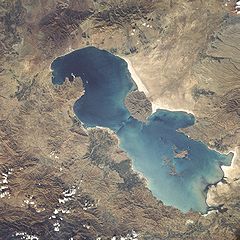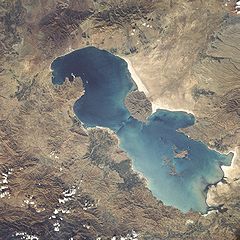 Tehran, Oct 27, IRNA � The United Nations Resident Coordinator Gary Lewis has proposed ways to prevent the death of the world�s largest slatwater lake, the Lake of Orumiyeh.�
Tehran, Oct 27, IRNA � The United Nations Resident Coordinator Gary Lewis has proposed ways to prevent the death of the world�s largest slatwater lake, the Lake of Orumiyeh.�The UN Information Center (UNIC) to Tehran quoted the official in a press release on Sunday as noting in a report that the slow death of the Lake Orumiyeh signals a warning for the future.
Lewis said that he has recently visited the lake to see the situation in person.
Warning that the lake �is drying up at an alarming rate,� he said the essential problem was that the �outflow has vastly exceeded the inflow in recent years. Add to this a recent drought, and, as a result, the water levels keep declining.
Stressing the lake�s �celebrated status,� Lewis said there were solutions to halt the trend of its speedy dying out.
�It is possible that what is happening to Lake Orumiyeh is one of the most vivid examples � anywhere on the planet � of how rapidly we humans can destroy our environment,� Lewis said.
However, he added, �There is still time to help save Lake Orumiyeh, but if that is to happen the government, the people of Iran and the international community must act now.�
Referring to the shrinking of the lake�s surface area dring the past two decades (from 5,000 square kilometers to 2,000 square kilometers), he warned, �In summary, we are at risk of a �perfect storm�: water scarcity � land degradation � and climate change � all feeding into each other.
�To combat this, Iran needs to enhance current water and natural resources management approaches while developing climate-change-resilience in various sectors at the national and community level.�
Referring to a UN-supported plan, Lewis said Since 2005, the �Wetlands Project� � jointly implemented by the Government of Iran, the Global Environment Facility and the UN Development Programme (UNDP) � has been providing a scientific evidence base to track the unfolding environmental disaster in Uromiyeh. The project has led to an improvement in Uromiyeh-basin institutional arrangements to implement the management plans which can solve the problem. Crucially, public awareness of the threat has also increased as a result of this work.�
According to the official, the plan is currently offering the best prospect for halting and reversing the decline in the Orumiyeh basin.
�But the main problem remains speed. All this is taking place far too slowly. To turn things around, we need to take a long term view � but we also need to act quickly right now.
�In the long run, and in order to play its own role in halting climate change, Iran needs to shift away from its current high-carbon-intensive development path to energy efficiency, conservation and the use of cleaner, renewable energy. We need to re-afforest desertified lands and improve sustainable livelihoods for people who live in the parched zones of Iran.
The real breakthrough � I believe � will only come when discussion on the impact of climate change goes beyond a discourse between the technocrats and policy-makers. We need to build climate-change-resilience-thinking at the community level.�
Lewis added that the public as a whole � but especially the youth � needed to understand what is at stake.
�For this, we need much � much � more public discussion and awareness-raising.,� he suggested.
The UN coordinator also referred to �four key actions we can take which are easier in the short- to medium-term.�
The four actions included to:
1. Involve all interest groups in planning resource allocations for the future of Lake Orumiyeh
2. Stop treating water as an open resource and price it at what it is worth
3. Stop the illegal harvesting of water
4. Question the idea of an inter-basin transfer of water
Referring to the role which could be played by the UN to help save the Lake of Orumiyeh, Lewis said the body could support the climate change resilience initiatives �as a mark of willingness to engage with Iran in an area of common interest at a time of immense diplomatic opportunity given recent developments at the UN General Assembly in New York and elsewhere.
�Finally, the UN can also play an active role in exchanging lessons learnt and the use of best practices. These efforts can complement those at the local level to support a �Save Uromiyeh� campaign.�
By IRNA
The Iran Project is not responsible for the content of quoted articles.











